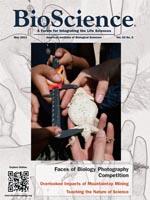The article on the overlooked terrestrial impacts of mountaintop mining that appears on p. 335 of this issue provides a valuable overview of research on this destructive and polluting practice. The authors, James Wickham of the US Environmental Protection Agency's National Exposure Research Laboratory, Petra Bohall Wood of the US Geological Survey's (USGS) West Virginia Cooperative Fish and Wildlife Research Unit, and eight others, draw attention to the dearth of research on terrestrial—as distinct from aquatic—effects of this mining technique. But readers of the article should know that, after it went through peer review, revision, approval by a BioScience editorial board member, formal acceptance, editing by BioScience staff, and approval of the edits by the authors, Wickham and Wood wrote BioScience to say that the USGS required a change before the article could be published.
The change that the USGS required was small, but it is worth describing. The authors had written in their discussion section that “Reliance on the framework established by the National Environmental Policy Act (NEPA), the law that established the requirement for an environmental assessment or an EIS [environmental impact statement] for actions proposed by US federal agencies that have the potential to affect the natural environment (CEQ 2007), seems to be appropriate for addressing the potential terrestrial impacts of mountaintop mining.” That judgment was too much for the USGS: In the published version of the article, “seems to be appropriate” in the quoted sentence has been changed to “could be an appropriate option.” The justification for the late change was a statement included in the (peer-reviewed, revised) version of the manuscript that it was “not yet approved for publication by the US Geological Survey.” The inclusion of that statement in submitted articles, which gives the agency the right to demand post-peer-review changes such as this one, represents a change in the USGS's practice: The statement has not appeared on other manuscripts submitted by USGS authors.
The edit is irrelevant to scientific integrity, some might argue, since it affects a judgment about policy, rather than a strictly scientific conclusion. If the USGS had required censorship of or a change to a scientific conclusion, BioScience would not have published the article: AIBS has long championed scientific integrity policies at scientific federal agencies (see, e.g., www.aibs.org/positionstatements/20100929 interior_scientific_integritv.html). In any case, according to one school of thought, policy preferences should not be expressed in scientific articles. On that view, we should thank the USGS for saving us from laxity.
Yet, it is hard for authors to discuss policies without revealing more or less directly which ones they favor (and most people would not want to read articles that revealed no such judgments). So, from an academic and editorial perspective, it is problematic for agencies to require the option of making changes after peer review. Some cases may be more difficult than this one to adjudicate. The policy says, in effect, that the agency does not trust its own scientists to maintain the integrity of a manuscript after submission. BioScience reserves the option to disallow any changes requested after a manuscript has been accepted, as it always has. Moreover, BioScience will in the future not accept revised manuscripts marked as subject to subsequent agency review.





